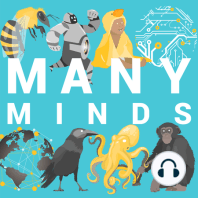UNLIMITED
Cultures of the deep: A conversation with Luke Rendell by Many Mindsratings:
Length:
76 minutes
Released:
Jan 7, 2022
Format:
Podcast episode
Description
We're on a brief winter break right now, but we'll be back later in January. To tide you over, here's one of our favorite episodes from 2021: a conversation with Dr. Luke Rendell about culture in whales and dolphins. Enjoy! -- Whales and dolphins are, without a doubt, some of the most charismatic, enigmatic creatures around. Part of what draws us to them is that—different as our worlds are from theirs, different as our bodies are—we sense a certain kinship. We know they’ve got big brains, much like we do. We know that some cetacean species live long lives, sing songs, and form close bonds. If you’re like me, you may have also wondered about other parallels. For example, do whales and dolphins have something we might want to call culture? If so, what do those cultures look like? What sorts of traditions might these animals be innovating and circulating down in the depths? On this week’s episode I chatted with Dr. Luke Rendell, a Reader in the School of Biology and a member of the Sea Mammal Research Unit at the University of St Andrews in Scotland. He’s been studying cetaceans for more than two decades. He’s the author, with Hal Whitehead, of the 2014 book The Cultural Lives of Whales and Dolphins. (You can probably guess by the book’s title where Luke comes down on the question of cetacean culture.) Luke’s work is, to my mind, an impressive blend of naturalistic observation, cutting edge methods, and big-picture theorizing. In this conversation, Luke and I do a bit of “Cetaceans 101.” We talk about what culture is and why whale song is a good example of it. We discuss lob-tail feeding in humpback whales and tail-walking in bottlenose dolphins. We talk about Luke’s very recent work on how sperm whales in the 19th century may have learned from each other how to evade whalers. And we discuss why an understanding of culture may be crucial for ongoing cetacean conservation efforts. We didn’t plumb all the depths of this rich topic—nor did we exhaust all the maritime puns—but we did have a far-reaching chat about some of the most fascinating beings on our planet and their distinctive cultures. As always, thanks a bunch for listening folks. On to my conversation with Dr. Luke Rendell. Enjoy! A transcript of this episode is available here. Notes and links 2:30 – My favorite edition of Moby Dick (for what it’s worth). 6:45 – A primer on cetaceans. 9:30 – A paper on the ins and outs of the whale nose. 10:45 – A general audience article about echolocation in cetaceans, drawing on this recent academic article. 12:30 – A discussion of Roger Payne’s storied whale song album. 19:00 – A paper on cetacean brain and body size. 19:45 – Dr. Rendell’s 2001 article in Behavioral and Brain Sciences, co-authored with Hal Whitehead. The paper made a splash. 24:50 – A paper by Dr. Rendell and colleagues describing some of his work on whale song. 26:40 – The 2000 paper by Michael Noad and colleagues, presenting some of compelling early evidence for whale song as a culturally transmitted phenomenon. 28:30 – A subsequent paper by Ellen Garland, Michael Noad, and colleagues showing further evidence for the socially transmitted nature of song. 31:45 – Dr. Rendell has also done important theoretical work on social learning strategies. See, for instance, here and here. 33:24 – An article offering evidence of imitation in killer whales. 36:10 – The paper by Dr. Rendell and colleagues on lob-tail feeding in humpback whales. 36:35 – A video illustrating “bubble net feeding.” 47:45 – The paper by Dr. Rendell and colleagues on tail-walking in dolphins. 55:30 – The paper by Dr. Rendell and colleagues on 19th century sperm whales' evasion tactics, as well as a popular piece on the same. 57:00 – A website documenting various aspects of whaling history. 1:05:00 – A recent discussion of gene-culture co-evolution across animal species. 1:10:00 – A recent paper by Dr. Rendell and (many) colleagues about how an appreciation of animal culture offers important lesson
Released:
Jan 7, 2022
Format:
Podcast episode
Titles in the series (100)
- 76 min listen
